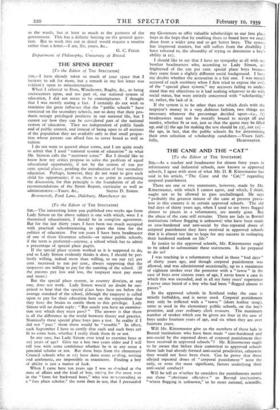[To the Editor of THE SPECTATOR]
Strt,—The interesting letter you published two weeks ago from Lady Simon on the above subject is one with which, were I a theoretical educationist, I should be in complete agreement. But for the last thirty years I have been too much occupied with practical schoolmastering to spare the time for the politics of education. For ten years I have been headmaster of one of these Grammar schools—or minor public schools, if the term is preferred—anyway, a school which has to admit a percentage of special place pupils.
If the special place system worked as it is supposed to do, and as Lady Simon evidently thinks it does, I should be per- fectly willing, indeed more than willing, to see our 121 per cent. increased to too per cent., always supposing that the taxpayers are willing to pay for the running of the school. (If the parents pay less and less, the taxpayer must pay more and more.) But the special place system, in country districts, at any rate, does not work. Lady Simon would no doubt be sur- prised to hear that the special place boys here are below the average standard of the school, although the taxpayer is called upon to pay for their education here on the supposition that they have the brains to entitle them to this privilege. Lady Simon will no doubt reply : "But surely you have an examina- tion test which they must pass? " The answer is that there is all the difference in the world between theory and practice. Nominally these special place boys pass a test. In reality if I did not "pass ',' them there would be "trouble." In effect, each September I have to certify that such and such boys are fit to come here, whether I really think them fit or not.
In any case, has Lady Simon ever tried to examine boys at HI years of age? Give me a boy two years older and I will tell you with some confidence whether he is in any sense a potential scholar or not. But these boys from the elementary Council schools who at i if have done some re ding, writing and arithmetic, are impossible as examinees. Finding a boy of ability is just a matter of luck.
When I came here ten years ago I was so shocked at the state of affairs and the kind of boy, sitting for the most part in the "form for backward boys," who was m"souerading as a "free place scholar," the term then in use, that I persuaded
my Governors to offer valuable scholarships to our free place boys in the hope that by enabling them to board here we could draw from a wider area and so get better boys. The system has improved matters, but still suffers from the disability I have referred to, the absurdity of trying to determine a boy's ability at iij.
I should like to say that I have no sympathy at all with my brother headmasters who, according to Lady Simon, are frightened of the too per cent. special ,place boys because they come from a slightly different social background. I have my doubts whether the accusation is a fair one. I was myself accused of such snobbery when I first tried to expose the evils of the "special place system," my accusers failing to under- stand that my objections to it had nothing whatever to do with social status, but were entirely concerned with "scholarship," or, rather, the lack of it.
If the system is to be other than one which deals with the taxpayer's money in a very dubious fashion, two things are necessary whatever the percentage decided upon—i.e., ,(i) headmasters must not be morally bound to accept all and sundry, whether fit or not, just so that the quota may be filled up, and (2) the age for making the test should be 131, not the age, in fact, that the public schools fix for determining their own selection of scholarship candidates.—Yours faith-














































 Previous page
Previous page